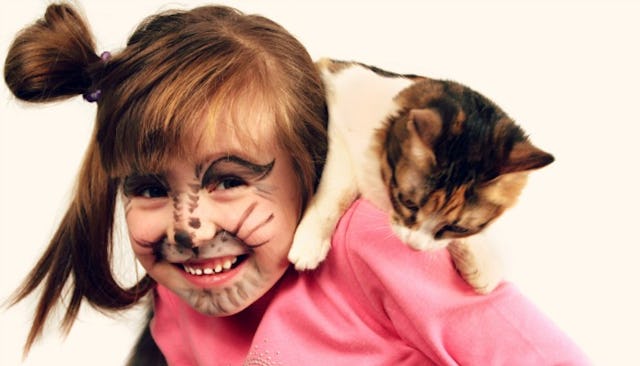Helping My Kid Embrace Her Weirdness

Our middle child is an animal. When she was 3 years old, we got her a baby doll, which she instantly and without a touch of irony named “Horse.” Around the same age, she began galloping around on all fours—not crawling but galloping with mind-boggling speed and full-on clippity-clop sounds. Any chance she got, she would trot, canter, whinny, neigh, and otherwise embody a wild horse.
Around age 7, she shifted to cats. Her ability to win races on all fours still came in handy, only now she meowed and purred and lapped water from a bowl instead of drinking from a cup. Four birthdays in a row were cat-themed. She started off as a reluctant reader, but devoured 42 full-length novels in six months when she discovered the Warriors book series about feral cats that live in clans and battle for prey and territory.
More recently, she has taken on the stance, movements, and eating habits of a bald eagle. It’s actually quite impressive how accurately she can portray any animal she decides to observe closely. But while it was adorable when she was little, now that she’s 11, her animal behaviors come across as more quirky than cute, more odd than adorable. She came to me in tears one day because her friends were losing interest in playing “Warrior Cats.” Nobody understands that this isn’t just a silly game for her. On more than one occasion, she has lamented with heartfelt sincerity that she was born a human and not an animal. Being at one with the animal world is who she is.
As a parent, it’s been tricky to figure out how to help her navigate a social landscape that doesn’t necessarily fit her internal compass. We don’t want to squash her imagination, interests, and enthusiasm. We want her to be comfortable being who she is. But at the same time, kids (and adults) can be cruel. How do we let her know that not everyone is going to take kindly to her wild kingdom tendencies? How do we prepare her for the fact that some people are going to think she’s weird without sending the message that we think she’s weird?
In some ways, it helps that we homeschool. Without the social pressures of a constant, same-age peer environment, she’s had the freedom to let her freak flag fly without a lot of negative feedback. On the other hand, people already think homeschoolers are weird, and the fact that our kid thinks she should be an animal isn’t exactly battling that stereotype. (Sorry, fellow homeschoolers.)
The truth, though, is that everybody has quirks. Everyone is “weird” in their own way. The idea that there’s some normative standard for interests, personalities, behaviors, and habits is, frankly, a load of hogwash. How many people squelch their true passions because they don’t fit what society expects of them? How many people lose parts of themselves in the quest to “fit in” with some arbitrary crowd?
And on the flip side, how many creators, innovators, and peacemakers have turned the idea of “normal” or “expected” on its head? How many have embraced their quirks and weirdness to make the world a better place?
Who knows what our daughter will do with her animal instincts. Maybe she’ll run an animal rescue one day. Maybe she’ll fight to conserve animal habitats or research endangered species. Maybe she’ll leave this all behind in childhood and do something totally different with her life. All I know is that if she does give it up, it will be on her terms. It won’t be because we killed her spirit, and it won’t be because she gave in to social pressure. We will do our best to help her see her quirks as gifts, her “weird” as part of the wonderful uniqueness of her being.
That was our goal when we bought her a food and water bowl with her name on them for her 9th birthday—to show her that we see her for who she is and honor her oddities. We gave her some rules, of course—no eating like an animal at the dinner table, and only using her cat bowls when we didn’t have company—but that gift meant more to her than almost anything else we’ve ever given her.
Of course, when other parents found out we bought our daughter her own pet bowls for her birthday, they thought we were weird. But, hey, at least we know where she gets it!
So if you have kids who don’t fit the mold, who march to be the beat of their own drum, let them know you admire them for their peculiarities, not in spite of them. Tell them to shine their own unique light on the world, regardless of the shade other people may throw. Prepare them for the fact that it won’t always be easy—it takes courage and perseverance to be true to oneself, but building those qualities will help them reach their dreams.
And when they forget, remind them that everyone else is just as wonderfully weird as they are.